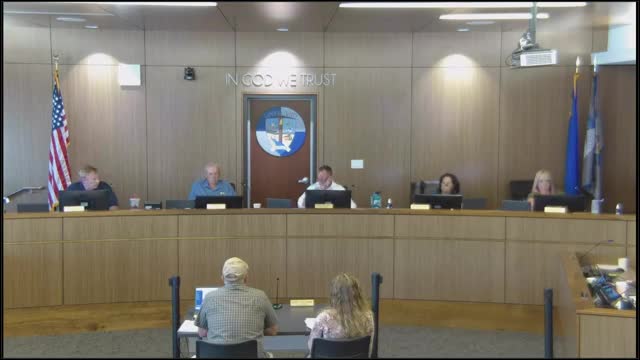County Commission Approves Major Zoning Changes Amid Controversy
June 28, 2024 | Lander County , Nevada

This article was created by AI summarizing key points discussed. AI makes mistakes, so for full details and context, please refer to the video of the full meeting. Please report any errors so we can fix them. Report an error »

In a recent government meeting, significant discussions centered around zoning changes and public safety policies, particularly regarding drug testing for county employees.
The meeting commenced with a motion to approve a zoning change application from Double K Land Company LLC, which sought to convert agricultural land into commercial zones. The motion was passed unanimously, indicating strong support for future development in the area.
Following this, Emerald Land Company LLC presented a proposal to change zoning from a 2.5-acre agricultural district to a 1-acre agricultural district to facilitate higher density residential development. Despite a previous recommendation for denial from the Planning Commission, the motion to approve the zoning change was passed after a brief discussion, highlighting the company's efforts to reduce the project size from 73 acres to 22 acres.
Another proposal from Emerald Land Company to divide a 70.15-acre parcel into smaller lots was also discussed. This request was initially denied due to zoning issues but was revisited after the appropriate zoning was established. The motion to approve this parcel map was passed, further indicating a trend towards accommodating residential development in the region.
A notable topic of discussion was the proposal for random drug testing of all county employees, including those in the judicial system. While there was general agreement on the need for random testing to ensure workplace safety, concerns were raised regarding the separation of powers between county government and the judiciary. A representative from the courts urged the commission to reconsider including court employees in the drug testing policy, citing a Supreme Court opinion that restricts county interference in court employee management. The commission ultimately decided to move forward with the policy, but discussions about potential adjustments and the inclusion of court employees will continue.
The meeting concluded with a review of the job description for the assistant county manager position, which included provisions for evaluations and oversight. The commission expressed a desire to ensure that the assistant county manager would be accountable while avoiding duplicative evaluations.
Overall, the meeting reflected a proactive approach to zoning and development while navigating the complexities of employee safety policies and intergovernmental relations.
The meeting commenced with a motion to approve a zoning change application from Double K Land Company LLC, which sought to convert agricultural land into commercial zones. The motion was passed unanimously, indicating strong support for future development in the area.
Following this, Emerald Land Company LLC presented a proposal to change zoning from a 2.5-acre agricultural district to a 1-acre agricultural district to facilitate higher density residential development. Despite a previous recommendation for denial from the Planning Commission, the motion to approve the zoning change was passed after a brief discussion, highlighting the company's efforts to reduce the project size from 73 acres to 22 acres.
Another proposal from Emerald Land Company to divide a 70.15-acre parcel into smaller lots was also discussed. This request was initially denied due to zoning issues but was revisited after the appropriate zoning was established. The motion to approve this parcel map was passed, further indicating a trend towards accommodating residential development in the region.
A notable topic of discussion was the proposal for random drug testing of all county employees, including those in the judicial system. While there was general agreement on the need for random testing to ensure workplace safety, concerns were raised regarding the separation of powers between county government and the judiciary. A representative from the courts urged the commission to reconsider including court employees in the drug testing policy, citing a Supreme Court opinion that restricts county interference in court employee management. The commission ultimately decided to move forward with the policy, but discussions about potential adjustments and the inclusion of court employees will continue.
The meeting concluded with a review of the job description for the assistant county manager position, which included provisions for evaluations and oversight. The commission expressed a desire to ensure that the assistant county manager would be accountable while avoiding duplicative evaluations.
Overall, the meeting reflected a proactive approach to zoning and development while navigating the complexities of employee safety policies and intergovernmental relations.
View full meeting
This article is based on a recent meeting—watch the full video and explore the complete transcript for deeper insights into the discussion.
View full meeting